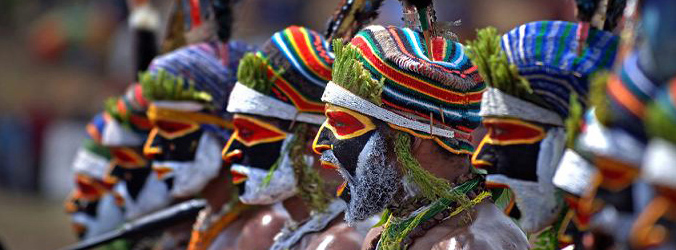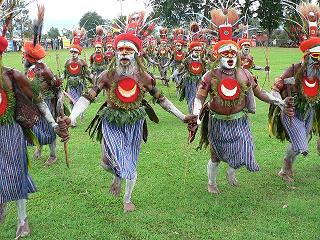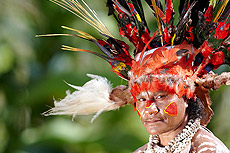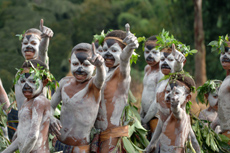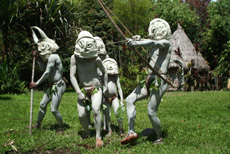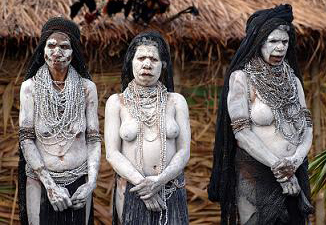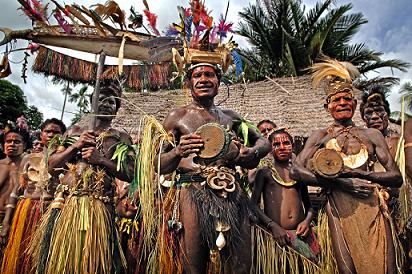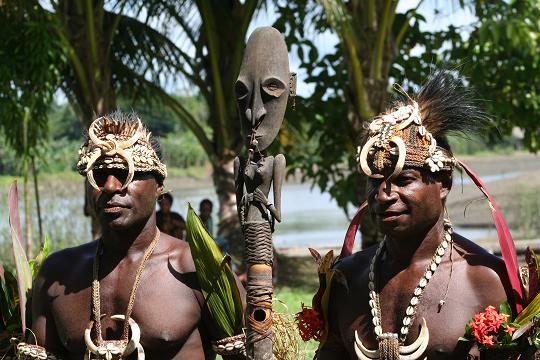Huli Culture
Tari, Hela Province....
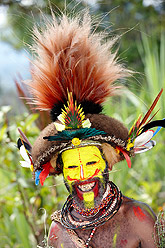 The Huli clan call the Hela Province and Southern Highlands of Papua New Guinea home. They regard themselves as one people descendant from a male ancestor called Huli. He is said to be the first man who gardened on Huli territory. Pigs are the Huli's main exchange commodity and they are often used to pay for bride price, death indemnities as well as ritual payments.
The Huli clan call the Hela Province and Southern Highlands of Papua New Guinea home. They regard themselves as one people descendant from a male ancestor called Huli. He is said to be the first man who gardened on Huli territory. Pigs are the Huli's main exchange commodity and they are often used to pay for bride price, death indemnities as well as ritual payments.
Ambua is the Huli word for yellow clay. This clay is sacred in their culture as is the red ochre clay and sets the Huli warriors apart from all others with their unique and colourful traditional body decoration.
Unmarried Huli men prepare themselves for adulthood in a unique way. They enter a school for bachelors for a period of between roughly 18 months to 3 years where they receive instruction on the biological and ritual process of masculinization. The young males are separated from their mothers and all women for much of this period and when they aren't, they are absolutely forbidden from physical contact with any female. Sexual contact in particular would contaminate their stores of male essence.
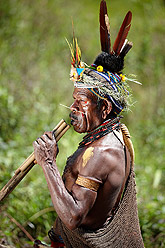 The Hela Province is the home of the renowned Huli Wigmen. Special magic and a restricted diet help build a boy into a man and make his hair grow strong and fast. Under the guidance of the cult expert, the boy's hair is picked out and periodically splashed with ritual water until it is long enough to be shaped by a circular band of bamboo into what looks like a mushroom of hair. Eventually this band is replaced by an oblong one creating an effect something like a toreador's hat. Throughout this period the boy sleeps on a headrest that prevents his hair from being squashed. After roughly 18 months the entire coif is clipped off close to the scalp and reformed to create the basis of the renowned Huli ceremonial wig. Iridescent blue Superb bird of paradise breastplates and parrot feathers are then added and in some locations the wig is also encased in red ochre.
The Hela Province is the home of the renowned Huli Wigmen. Special magic and a restricted diet help build a boy into a man and make his hair grow strong and fast. Under the guidance of the cult expert, the boy's hair is picked out and periodically splashed with ritual water until it is long enough to be shaped by a circular band of bamboo into what looks like a mushroom of hair. Eventually this band is replaced by an oblong one creating an effect something like a toreador's hat. Throughout this period the boy sleeps on a headrest that prevents his hair from being squashed. After roughly 18 months the entire coif is clipped off close to the scalp and reformed to create the basis of the renowned Huli ceremonial wig. Iridescent blue Superb bird of paradise breastplates and parrot feathers are then added and in some locations the wig is also encased in red ochre.
Great trenches, up to five metres deep, criss-cross the floor of the Tari Basin. These huge inter-connected channels, dug by hand with simple digging sticks, define family boundaries, control their pigs and guard against enemy intrusions. The Huli, clearly do not live in peace.
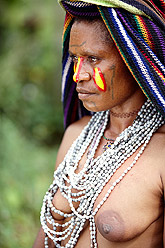 There are no Huli "chiefs" in the hereditary sense, all leaders come to power through their ability at war, skill in mediating disputes and by amassing wealth in pigs and shells. Warfare is never ending within the Huli culture. Vengeance is preferred to any peaceful settlement and when a person returns one injury with a greater one, his victim normally seeks counter vengeance rather than accept this as justice. Most Huli wars originate from personal disputes between individuals, with alliances centering on the issue and its main players. Even today, the Tari Valley in the Southern highlands of Papua New Guinea has a real frontier atmosphere.
There are no Huli "chiefs" in the hereditary sense, all leaders come to power through their ability at war, skill in mediating disputes and by amassing wealth in pigs and shells. Warfare is never ending within the Huli culture. Vengeance is preferred to any peaceful settlement and when a person returns one injury with a greater one, his victim normally seeks counter vengeance rather than accept this as justice. Most Huli wars originate from personal disputes between individuals, with alliances centering on the issue and its main players. Even today, the Tari Valley in the Southern highlands of Papua New Guinea has a real frontier atmosphere.
The perfect place to stay to experience the unique Huli culture in the Hela Province of Papua New Guinea is Ambua Lodge. Trans Niugini Tours provides day touring programs from Ambua Lodge which allow you to visit villages and experience the Huli culture while you are in the safety of our experienced and knowledgeable local guides.



